BOOK FOREWORD
Social justice – ‘It takes a lawyer, an activist and a storyteller to change the world’
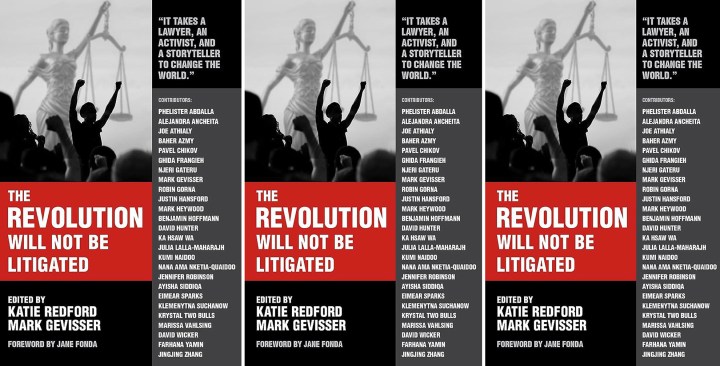
In a new book called The Revolution Will Not Be Litigated, Mark Gevisser and Katie Redford have gathered together 25 of the world’s most accomplished and celebrated activists and movement lawyers, and worked with them to become storytellers – so that they can reflect on their experiences at the front lines of some of the most significant struggles of our time.
In an era in which human rights are under threat, their words offer both an inspiration and a compass for the way movements can use the law – and must sometimes break it – to bring about social justice.
The contributors here take you into their worlds. Close to home, Maverick Citizen editor Mark Heywood looks back at the way the Treatment Action Campaign used the law to make Aids antiretrovirals available to all South Africans, and Kumi Naidoo applies the lessons he learned in the anti-apartheid struggle to his global activism at Greenpeace and Amnesty International.
Elsewhere in Africa, Njeri Gateru and Phlelister Abdalla look at the Kenyan LGBTQI+ rights and sex-workers’ rights struggles, respectively, and Julia Lalla-Maharajh looks at the limitations of the law in stopping Female Genital Cutting. In other contributions, Jennifer Robinson is frantically orchestrating protests outside London’s Ecuadorian embassy to prevent the authorities from arresting her client Julian Assange; Justin Hansford is at the barricades during the protests over the murder of Black teenager Mike Brown in Ferguson, Missouri; Ghida Frangieh is in Lebanon’s detention centres trying to access arrested protesters during the 2019 revolution; Pavel Chikov defends Pussy Riot and other abused prisoners in Russia; and Ayisha Siddiqa, a shy Pakistani immigrant, discovers community in her new home while leading the 2019 youth climate strike in Manhattan.
The stories in The Revolution Will Not Be Litigated capture the complex, and often-awkward dance between legal reform and social change. They are more than compelling portraits of fascinating lives and work, they are revelatory: of generational transitions, of epochal change and apocalyptic anxiety, of the ethical dilemmas that define our age, and of how one can make a positive impact when the odds are stacked against you in a harsh world of climate crisis and ruthless globalisation.
Below, you can read extracts from Jane Fonda’s foreword to the book.
***
Some Personal Reflections on People Power and Legal Power
My first run-in with the law was when Nixon’s White House broke it, and I got arrested.
It was on November 3, 1970, at Cleveland Hopkins Airport. I had flown in from Canada, my first stop on a two-month-long speaking tour that would raise the funds to pay for the Winter Soldier Investigation. This was a project modeled on the Nuremberg trials that would bring active or formerly active soldiers from all branches of the US military to testify about the acts they had committed, or witnessed, in Vietnam.
The Watergate tapes would later reveal that President Nixon feared the GI movement more than any other part of the anti-war movement – he would do whatever he could to stop me, a famous actress, from providing a stage for GIs to tell the truth. As I went through customs in Cleveland, policemen were waiting to handcuff me and seize my luggage. When they found many small plastic envelopes of vitamins, I was booked on a trumped-up charge of drug smuggling. The arresting officer told me, bluntly, that he was acting on direct orders from the White House. Several months later, lab reports revealed the truth: the vitamins really were vitamins.
Later that year, as my antiwar activism gained momentum, the Nixon administration unleashed the CIA, the FBI, and its notorious COINTELPRO (Counter Intelligence Program) on me. This ranged from the planting of fake news articles about me to breaking into my home repeatedly to hacking my private bank account. I sued Nixon and seven of his henchmen. We settled, and got an apology from Nixon himself.
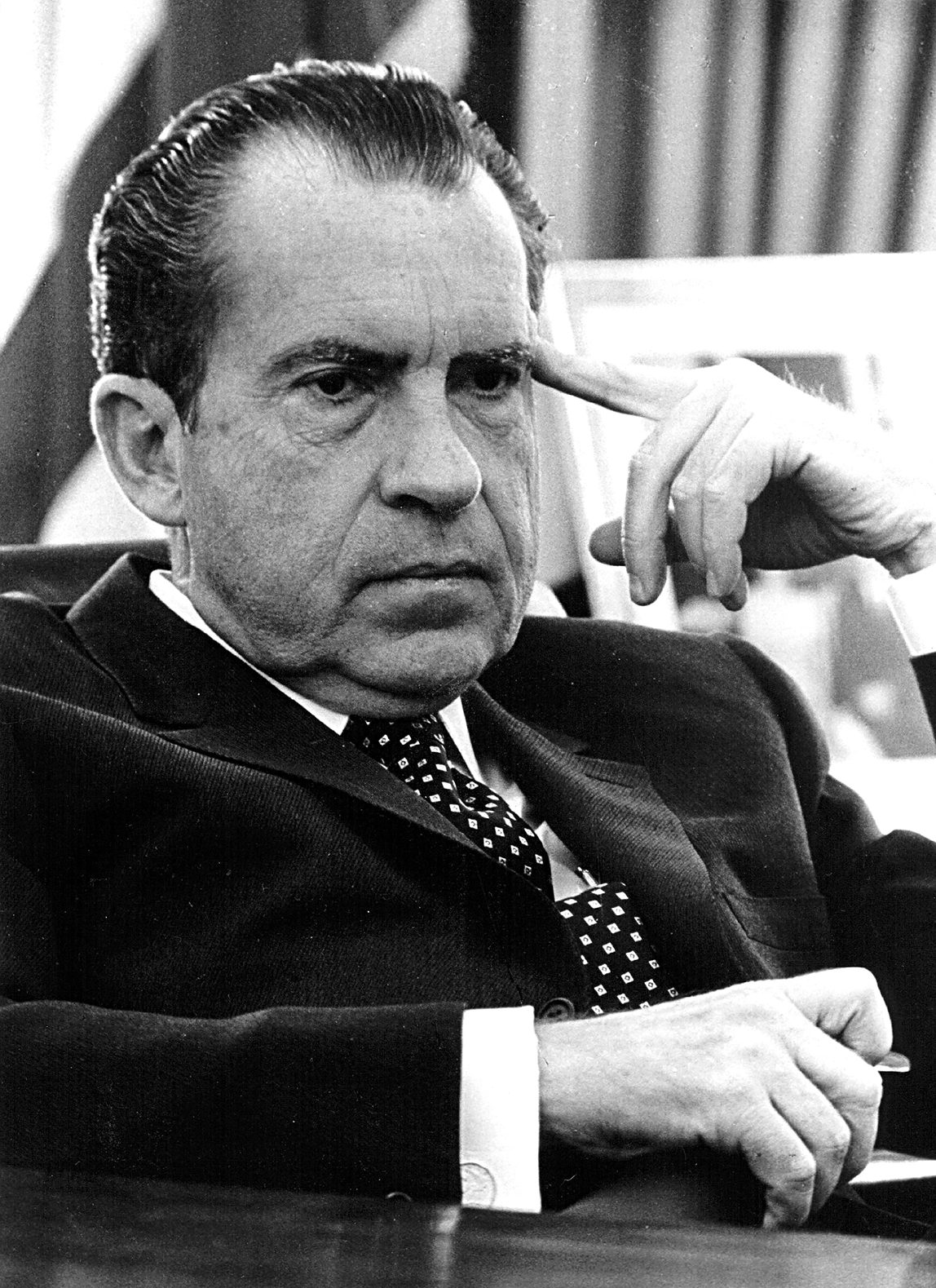
President Richard Nixon in the Oval Office, 19 February 1970, in Washington, DC. (Photo: Getty Images / National Archive / Newsmakers)
Was that justice? No! Justice would have been an end to the criminal murder of millions of Vietnamese soldiers and civilians and fifty-eight thousand American soldiers in Southeast Asia. But in the process of playing my role in the anti-war movement, I learned some powerful lessons about the themes of this urgent and necessary book, concerning the relationship between “the power of law” and “the power of people” in the struggle for justice. I have carried these lessons forward to my climate activism of today – and especially the Fire Drill Friday rallies and civil disobedience actions that have drawn so many into the fight for climate justice.
This book is filled with wisdom, with courage, and with a wealth of experience from some of the most effective activists and lawyers of the world. As I read it, one thing in particular has struck me, bearing out my own experience: the way “the power of law” and “the power of people” need to work together to bring about significant transformative change.
In my six decades as an activist, I have developed a keen sense of how important it is that we consider the law as a tool as we advance justice and social transformation. This book lays out many ways to do just that. It may be by seeking justice through litigation. It may be by using the law to defend ourselves against its abuse, even by its agents themselves. Or it may be by breaking the law, deliberately and purposefully, to draw attention to our causes.
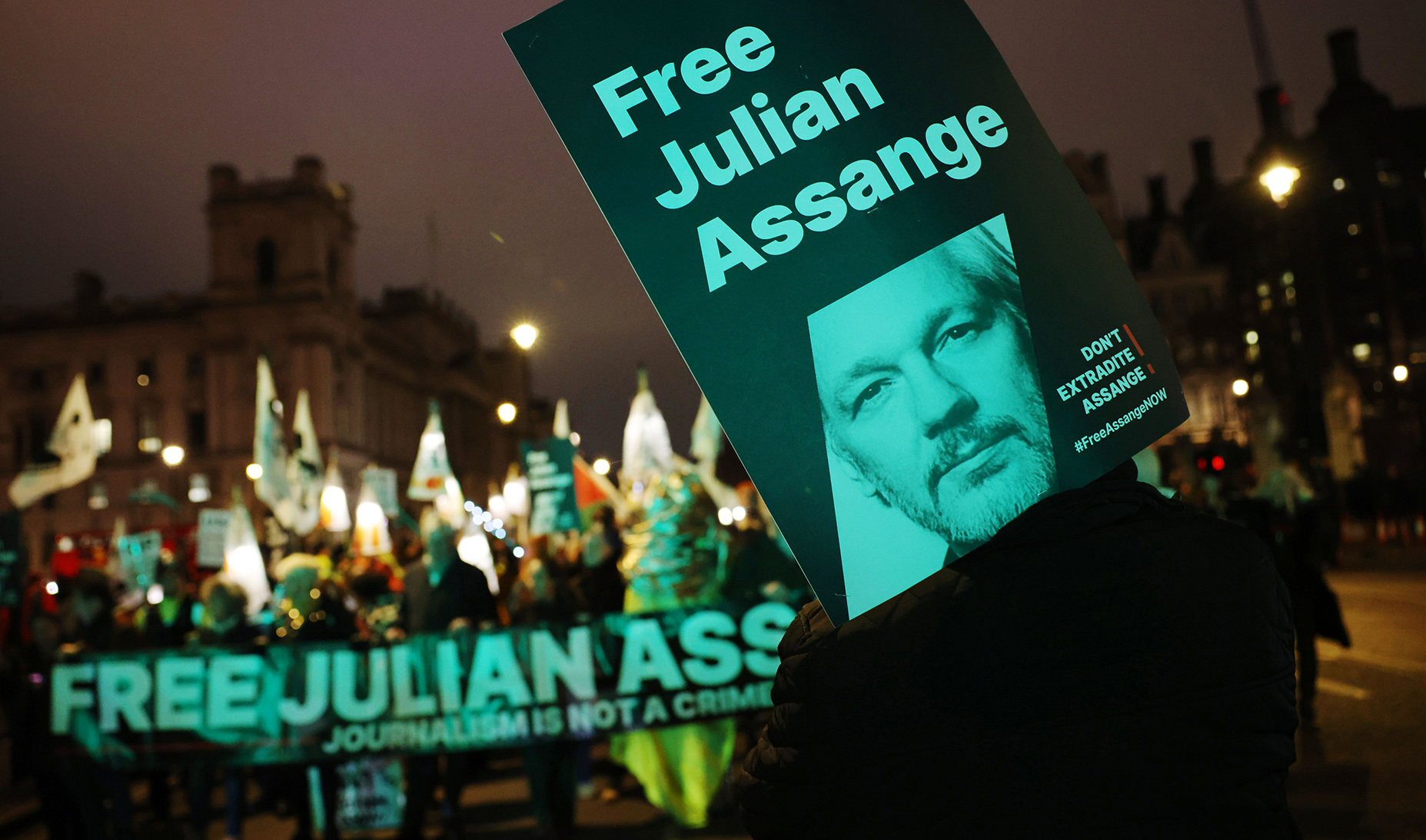
People carry placards during a protest in Westminster, London, against Julian Assange’s continued imprisonment on 11 February 2023. Assange faces a potential 175-year sentence if extradited to the US for his publishing work. All major free speech and human rights organisations including Amnesty, Reporters Without Borders, National Union of Journalists, Big Brother Watch and more oppose his extradition which they say is a ‘threat to press freedom around the globe’. (Photo: Dan Kitwood / Getty Images)
This book works from the maxim that “it takes a lawyer, an activist, and a storyteller to change the world.” If these essays hold valuable lessons for lawyers and activists and anyone interested in social justice, one of the most important is the very way they are written: they are gripping stories that will hold you even as they inform you. Their authors are all doers, people who have acted bravely to change the world. But they have come to understand, as I have, how public advocacy is nine tenths of any struggle – and that storytelling is what drives any public advocacy campaign, as it does any legal case.
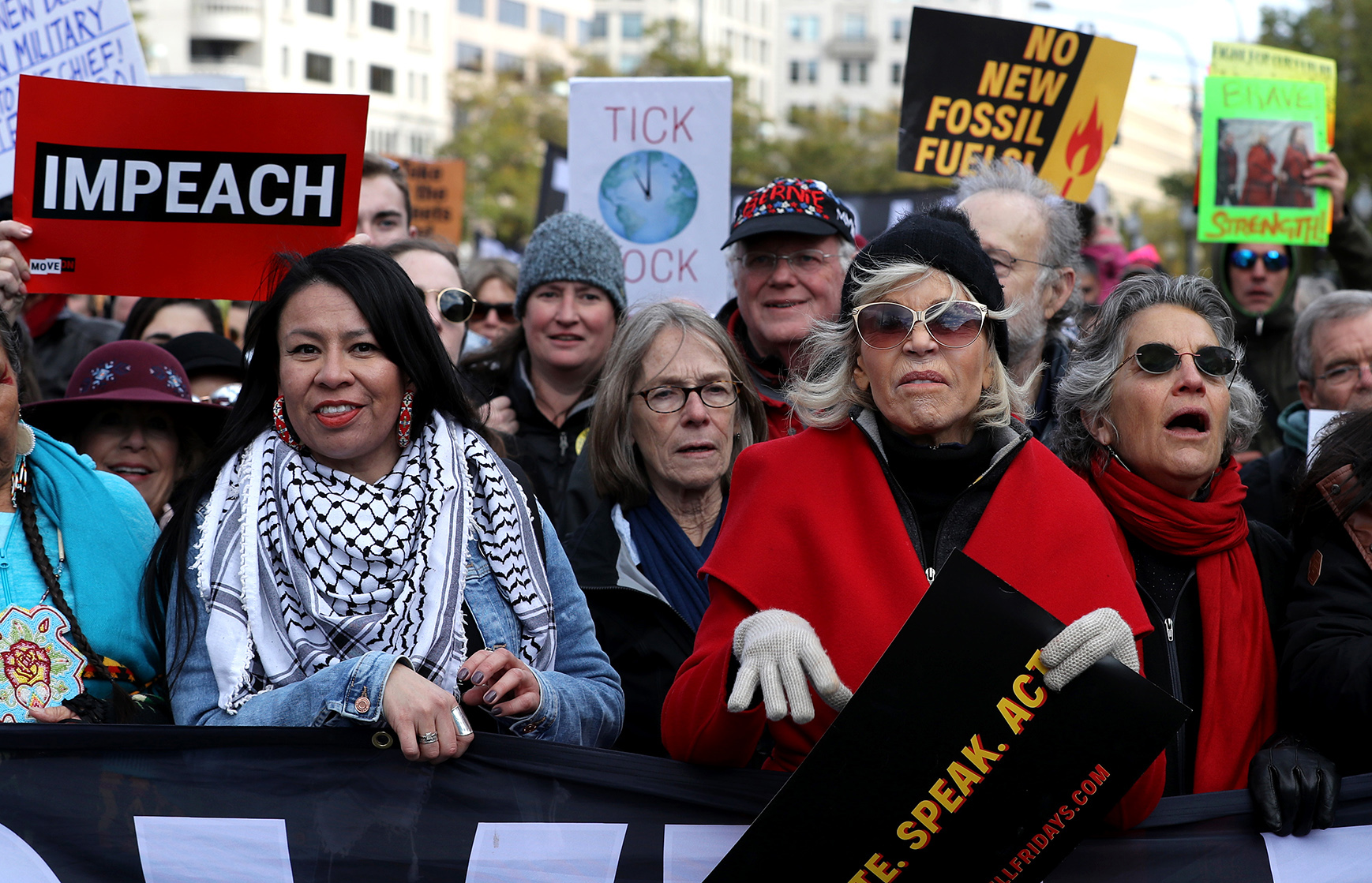
Actress Jane Fonda (centre, in red) leads hundreds of people in a march from the US Capitol to the White House as part of her ‘Fire Drill Fridays’ rally protesting against climate change, 8 November 2019, in Washington, DC. (Photo: Chip Somodevilla / Getty Images)
Having spent a working life in Hollywood, I have witnessed the transformative power of an affecting and well-told story. I’ve spent a parallel life supporting causes ranging from the anti-war movement and the women’s movement to the climate justice movement of today, and I have also come to understand the power of my own platform to draw attention to injustice and to seek protection for those being unfairly targeted. My intention has been to create a platform for others who have a story that urgently needs to be heard, be they the brave GIs or Indigenous activists. This has helped me appreciate the mobilizing power of the courtroom battle too: not just to change the law or get an innocent verdict, but to change hearts, minds, and attitudes through the power of storytelling.
Reading this book, I learned much about the power – but also the limitations – of strategic litigation. I came to understand two things, most of all: The first is that a case is often only a means to an end, which is the advancement of your cause. Even if you lose the case you can “win” in a court of public opinion, or in the way you have brought people together to take action. The second is that, in this arena at least, there is no “power of law” without the “power of people”: If you are seeking transformational change, a legal strategy must go hand-in-hand with a movement-building strategy. This is not only to get the evidence and the public support, but also to build resilience for the long battle ahead.
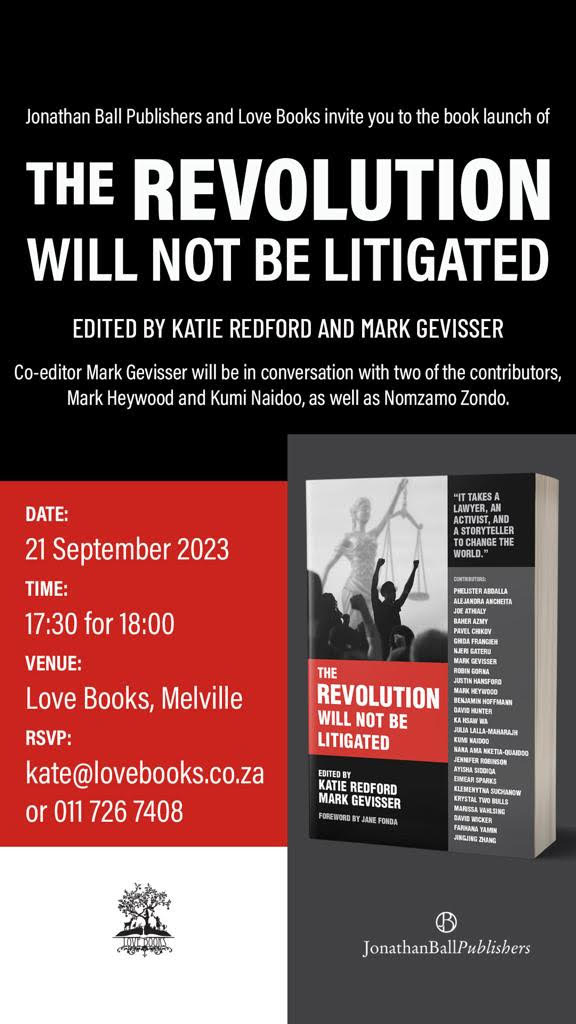
This book brilliantly sets out the three different paths for activists and lawyers to bring the radical changes we so urgently need. We activists can make the law through establishing precedent. We can also use the law to defend ourselves, when it has been abused by the authorities to shut us down as happened to me in the early 1970s. And, of course, we can choose to break the law too.
Now in my eighties, I have found myself at the barricades once more. “Where are our elders?” the young people who went on strike for climate justice were asking in 2019. “We can’t do this all by ourselves. We can’t even vote.” I was inspired by this, so I reached out to Greenpeace, an organization unafraid of taking bold action. I knew that, after forty years of marching and lobbying and petitioning and litigating and protesting, we needed to up the ante. Time is running out on the climate crisis. It was time for civil disobedience.
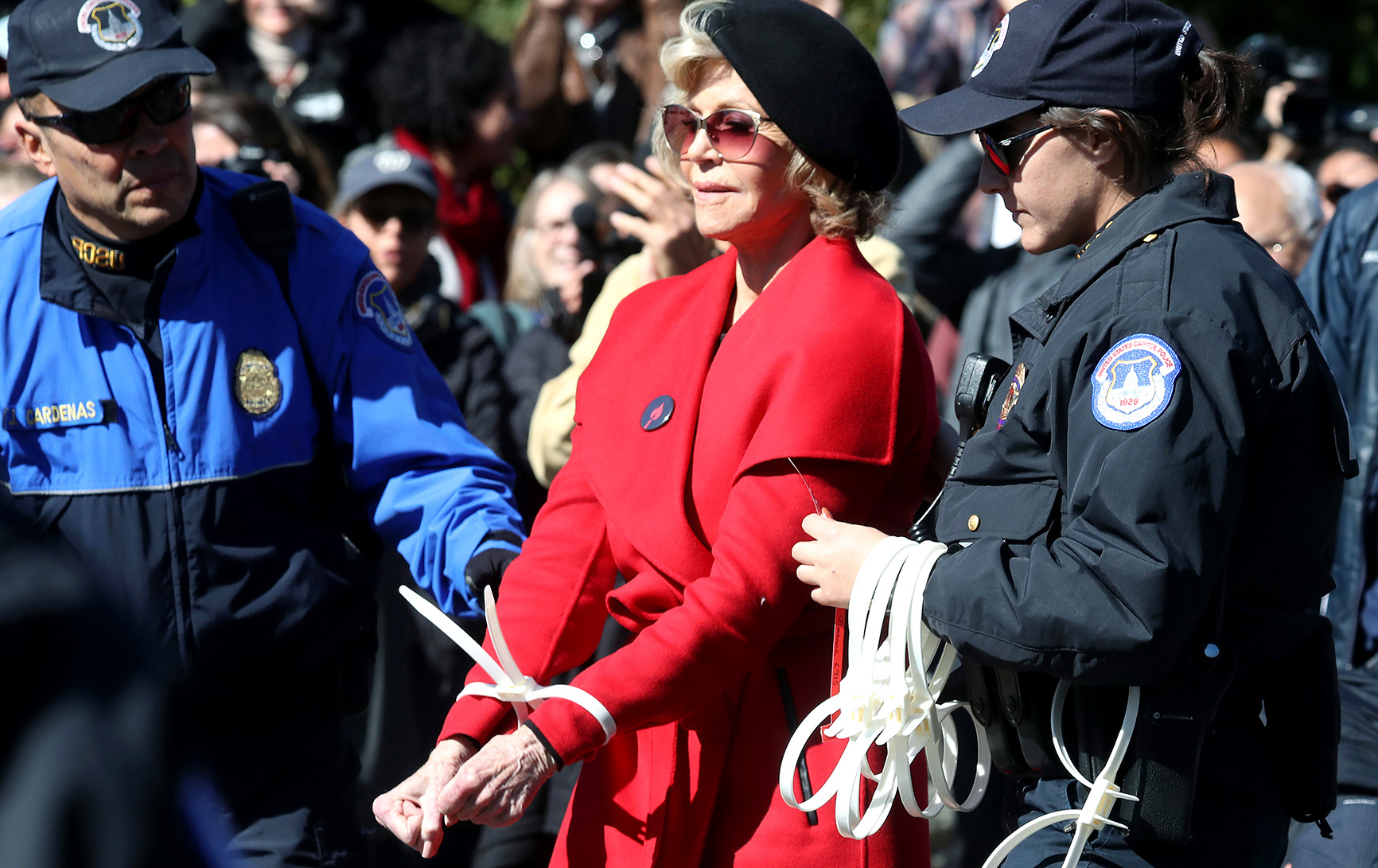
Actress Jane Fonda is arrested for blocking a street in front of the US Capitol during a ‘Fire Drill Fridays’ climate change protest and rally in Washington, DC on 18 October 2019. Protesters were demanding urgent action on adapting the Green New Deal, clean, renewable energy, and an end to all new fossil fuel exploration and drilling. (Photo: Mark Wilson / Getty Images)
In 2021, twenty-five million Americans – over 10 percent of the adult population – were so alarmed about the climate crisis that they were ready to act. But they haven’t done so because no one has asked. This is according to polling done by Yale University’s Climate and Communications Project. I call these people “The Great Unasked”, and the primary agenda of Fire Drill Fridays has been to use my platform to invite my compatriots to put their bodies on the line alongside me.
And so, in the fall of 2019, I moved to Washington, DC, and resolved to break the law every Friday until Congress passed the Green New Deal. Thousands joined me, and hundreds of thousands more supported us online – until Covid-19 compelled us to stop. Even though there was little risk for me physically in these weekly arrests, the spectacle of this eighty-three-year-old film star getting arrested – alongside so many powerful frontline activists and thousands of ordinary people – helped to create news, tell stories, and grow our movement. We have continued virtually through the pandemic, and nine million people have viewed our weekly program. Our volunteers called and texted over five million climate voters before the 2020 election, and we know we have influenced the progress made in climate policy by the Biden administration.
Of course, my brushes with the law are nothing compared to what you will read about in this book; to what protestors are experiencing at the hands of the military regime in Burma right now, or what Alexei Navalny is enduring in a Russian prison as I write. Back in the United States, we might sigh in relief at the end of the Trump era, with its tyrannical bent. But we still live with “law and order” rhetoric from Trumpist strongmen, in Texas and Florida for example, and we have the very recent memory of the way Movement for Black Lives protestors were dealt with on the streets of our cities. We also continue to live with the way Black people are murdered, by racist police officers, on the street or even in their beds, just for being Black.
But if the law is being abused, against people, it is also being harnessed, by people and with people. This book shows how: from Standing Rock to Ferguson, from Moscow to Myanmar, from abortion rights in Poland to LGBTQ rights in Kenya, from land rights in Mexico to prisoners’ rights in Lebanon, from the environmental movement in China to the climate move- ment in the United States. The anvil is white-hot at the moment, and we must use it quickly to ensure that the arc of history is, in the words of Rev King, bent toward justice. Because when it comes to climate justice, or racial equality, or any of the other vital struggles you will read about in this book, time is of the essence.
This book shows how the law can be used, for better or worse. Reading it will show you how it’s been used, across the world, to protect, unleash, and amplify people power. It has confirmed and deepened what I have known throughout my life, but have never put in words: The law is no magic bullet when it comes to bringing about change, but if you understand its power as a tool, you can harness it to bring about the change yourself – especially if you do it with others as a movement.
In this respect I have found The Revolution Will Not Be Litigated to be transformational.
I am sure you will too. DM
This is an edited extract from Jane Fonda’s foreword to The Revolution Will Not Be Litigated: People Power and Legal Power in the 21st Century (OR Books), edited by Mark Gevisser and Katie Redford (R450). Read more about the book here.
The Revolution Will Not Be Litigated will be launched at Love Books in Melville, Johannesburg, on 21 September at 6pm. Mark Gevisser will be in conversation with contributors Mark Heywood and Kumi Naidoo, as well as Nomzamo Zondo of the Socio-Economic Rights Institute (SERI).





















 Become an Insider
Become an Insider
Comments - Please login in order to comment.